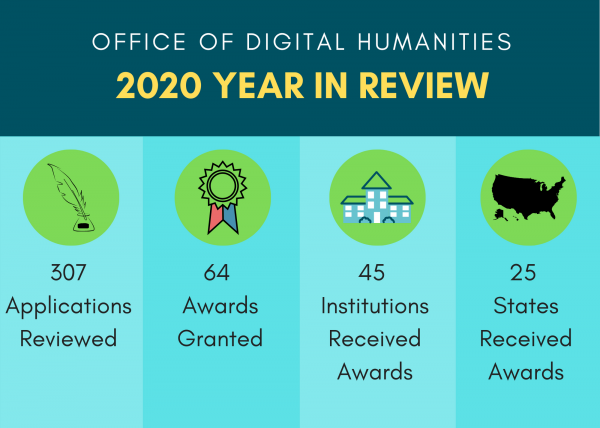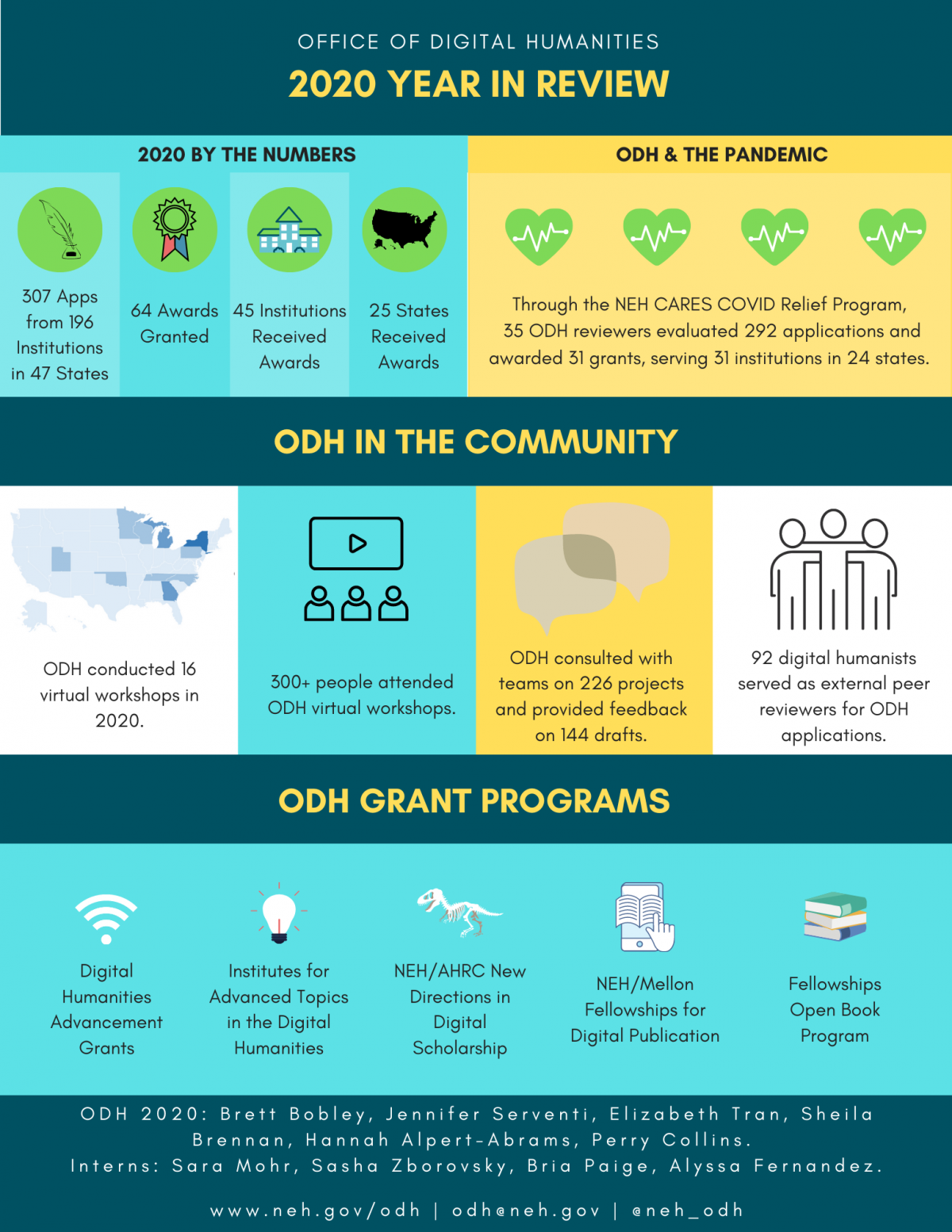ODH 2020: Year in Review

Infographic showing the applications and awards that ODH received this year.

Infographic showing the applications and awards that ODH received this year.
Digital Humanities Awards
In 2020, the Office of Digital Humanities worked with sixty-seven external reviewers to evaluate over three hundred grant applications, and made sixty-four awards across five grant programs. We distributed funds to forty-five different institutions across twenty-five states and territories.
Last year’s awards include:
-
An expansion of the Mukurtu content management system for Indigenous cultural heritage
-
A collaboration between the University of Texas at Austin and Lancaster University (UK) to transform unreadable Indigenous and Spanish colonial archives into accessible data using artificial intelligence technologies.
-
A digital humanities institute to help cultural organizations plan, develop, and launch crowdsourcing projects focused on engaging communities with their collections.
-
A digital publication that examines how technological infrastructure and algorithms interact with African-American authored literary texts to construct and deconstruct racial identities.
-
The conversion of more than twenty recent scholarly monographs into open access digital editions.
NEH CARES
Last year, the Office of Digital Humanities joined the NEH’s six other program offices, as well as staff across the agency, to oversee the distribution of $75 million of pandemic relief funding through the CARES act. Across the agency, this involved reviewing over three thousand applications and making over two hundred awards.
In the ODH, we worked with thirty-five external reviewers to evaluate almost three hundred applications, ultimately making thirty-one awards intended to help humanities institutions retain staff during the coronavirus pandemic. Among the institutions that received support were:
-
The 1947 Partition Archive, a Berkeley, California-based project dedicated to the task of collecting and preserving oral histories of the Partition of British India in 1947.
-
The University of North Dakota, which received funds to digitize and provide access to historical collections relating to regional and global history.
-
The Mashantucket Pequot Tribal Nation, which received funding to transcribe, edit, annotate and publish online a series of nineteenth-century Eastern and Mashantucket Pequot manuscript overseer reports.
ODH in the Community
In 2020, ODH staff held more than 226 consultations with teams developing digital projects to discuss funding opportunities and project ideas. We also provided feedback on 144 grant applications for our DHAG and IATDH programs.
Sadly, we were not able to travel around the country visiting institutions and attending conferences as we typically do. Instead, this year we launched a series of new outreach initiatives to help us connect virtually with more members of the digital humanities community.
Through this program, we conducted sixteen virtual workshops, speaking with more than three hundred people about NEH funding opportunities for digital research and teaching in the humanities. Thanks to everyone who joined us for these virtual sessions.
We were also fortunate to have four graduate student interns in 2020, who worked with our team to conduct in-depth research into the impact of our grant programs.
Learn more about the work of our summer 2020 interns Sara Mohr and Sasha Zborovsky, and stay tuned for more from our academic-year interns, Bria Paige and Alyssa Fernandez.
Looking Forward
The Office of Digital Humanities has been working remotely since March 2020, and we expect to continue to be remote until at least July of 2021. But we will continue to run all of our grant programs from our home offices, including a second round of New Directions in Digital Scholarship for Cultural Institutions, a new collaboration between the NEH and the UK’s Arts and Humanities Research Council.
We also expect to continue to hold virtual visits throughout 2021. We are fully booked for the Spring 2021 workshop series, but you can contact us to be added to our waitlist for fall of 2021.
Finally, the NEH has just announced that the agency will be distributing an additional $135 million this spring as part of the American Rescue Plan Act. These funds will be distributed through the state councils and through several grant programs overseen by the NEH. We will be recruiting reviewers for these programs soon, so please stay tuned if you would like to be involved! We are grateful for this opportunity to support the humanities.

